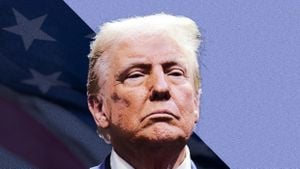Increasing military cooperation between North Korea and Russia has raised alarms for global leaders, particularly amid the protracted conflict between Russia and Ukraine. Recently, North Korea has begun to send significant military support to Russia, including troops and weapons, prompting joint concerns from the United States, South Korea, and Japan.
During a high-level summit held among leaders from these three nations, President Biden expressed grave concerns about the alliance between North Korea and Russia. The summit was significant as it marked Biden's last international gathering before leaving office, making the discussions particularly poignant. The trio condemned the actions being taken by North Korea to bolster Russia's military efforts, with Biden highlighting the dangers of deepening ties between Pyongyang and Moscow.
Joining forces with Russia, North Korean leader Kim Jong Un has committed thousands of troops to support Vladimir Putin’s military endeavors, primarily aimed at reclaiming lost territories during the tumultuous war against Ukraine. This extreme step not only escalates the stakes of the conflict but also signals Kim’s growing reliance on Russian support, turning him from isolation to strategic alliance.
"Deepening military cooperation between the D.P.R.K. and Russia, including munitions and ballistic missile transfers, is particularly egregious," the leaders stated, referring to North Korea by its official name. This signals the intensity of their concern over the shifting dynamic within the international community, especially as Russia occupies the chair of the U.N. Security Council, where such actions are expected to adhere to international regulations.
Biden’s remarks came at the conclusion of the summit held with Prime Minister Shigeru Ishiba of Japan and President Yoon Suk Yeol of South Korea. Their collaborative stance follows months of rising tensions due to North Korea's recent military activities, including tests of long-range ballistic missiles and the dispatch of troops to Russian soil.
Reports indicate North Korea has deployed approximately 10,000 soldiers to help strengthen Russian forces. This military cooperation does not end with troop movements; Pyongyang is also suspected of supplying munitions, including artillery shells previously produced for its army. Analysts believe these supplies have aided Russia’s faltering war efforts against Ukraine, which has caused severe personnel and equipment losses.
The ramifications of this arrangement could have various impacts, not just for the immediate region but globally. Some analysts see this as a strategic calculation by both Kim and Putin; North Korea gets much-needed economic lifelines and political support, whereas Russia bolsters its defenses without shifting its troops from other fronts. According to experts, Moscow may even help improve North Korea's military technologies, which raises fears about nuclear capability enhancements.
Donald Trump’s recent election victory adds another layer of uncertainty to the situation. Having previously expressed ambivalence about U.S. commitments abroad, his approach to North Korea and Russia remains to be seen. This unpredictability contributes to anxiety among allies who have remained resolute against North Korea's military ambitions. Trump’s administration may approach these alliances quite differently, which could disrupt the current collaborative stance.
Seoul’s position is precarious, as they balance support for Ukraine against the North's growing military assertiveness. Although some South Korean officials have hinted they may reconsider their military support for Ukraine, others argue against bowing to the North's influence. A Ukrainian charity co-founder recently emphasized the urgency of supplying Ukraine with assistance, noting the unique military experience North Korea's troops could gain from serving alongside Russian forces, enhancing their capabilities.
Geopolitical analysts have flagged the potential for increased instability, not only for Ukraine but for the broader Asian region. The collaboration between these two nations can potentially lead to escalated military actions by North Korea and pose new threats to U.S. allies, making the peaceful resolution of the Ukraine situation increasingly elusive.
Back home, Biden and his administration face scrutiny from both sides of the political aisle, as the effectiveness of their measures against North Korean aggression will be measured against the actions of the incoming Trump administration. Biden’s diplomatic success is under threat of being dismissed, potentially undoing the strategic partnerships formed during his presidency.
Moving forward, the United States plans to keep vigilant about North Korea's ambitions, as past transitions of power have often seen the North engage aggressively on the international stage, testing treaties and alliances established by previous administrations. Security analysts highlight the risks of this as tensions continue to build.
With military cooperation between North Korea and Russia solidifying, the global community watches closely. Key leaders strategizing for the future will need to navigate the shifting tides of this alliance and its potential repercussions for international stability and security.



